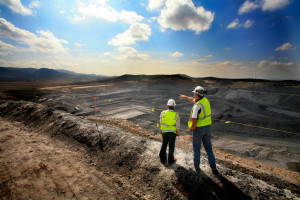Sustainable Skills CEO testifies before a Senate Committee about the Indonesia-Australia Comprehensive Economic Partnership Agreement
 On 2nd September 2019, our CEO, Nigel Carpenter, was invited to give evidence about the Indonesia-Australia Comprehensive Economic Parthership Agreement (IA-CEPA), drawing on our two-year experience working with the Indonesian Government to improve their TVET system. Signed on 4th March 2019, IA-CEPA creates a framework for Australia and Indonesia to unlock the vast potential of the bilateral economic partnership, fostering economic cooperation between businesses, communities and individuals.
On 2nd September 2019, our CEO, Nigel Carpenter, was invited to give evidence about the Indonesia-Australia Comprehensive Economic Parthership Agreement (IA-CEPA), drawing on our two-year experience working with the Indonesian Government to improve their TVET system. Signed on 4th March 2019, IA-CEPA creates a framework for Australia and Indonesia to unlock the vast potential of the bilateral economic partnership, fostering economic cooperation between businesses, communities and individuals.
Here, the full transcripts of Nigel’s hearing which reflect our view about the significant opportunity IA-CEPA opens for world-class Australian training providers to contribute to skilling the Indonesian workforce into the future.
Mr Carpenter: Thank you for this opportunity to express our views on the Indonesia-Australia Comprehensive Economic Partnership Agreement. If I can just introduce our organisation a little bit, we’re an international consultancy based in Sydney. We’re a not-for-profit that develops, supports and assists effective technical and vocational education training systems worldwide. We were originally established in 2003 as an industry skills council in Australia and have been working overseas for seven years, and we have been doing this full time since 2016. Our approach is to get close to government and understand culture and systems and help those governments improve the way they manage vocational education based on the core principles of a successful vocational education system. We’ve worked in a number of countries in Africa and Asia, and we have been focusing on Indonesia since 2016. In fact, last week I returned from my 32nd visit in the last three years.
The reasons for focusing on Indonesia are the President’s stated objective of improving vocational skills, particularly vocational education based on industry engagement, which Australia has a strong strength in, and also the IA-CEPA, with the view that these closer ties will help facilitate further activity in this space. During our time there, we have built relationships with quite a few Indonesia ministries the Coordinating Ministry for Economic Affairs; the Ministry of Research, Technology and Higher Education; the Ministry of Education and Culture; the Ministry of Manpower; and others. Each of them is currently working on vocational education training reform plans. They’ve shared their plans with us, and we’ve tried to steer them in the right direction. Our own view about the state of their vocational education system is that there is no industry engagement. There are massive numbers of people being trained and these numbers are increasing, but the quality is very poor, and single digits get jobs in the industries that they’ve trained for. The amount of industry engagement is minimal. The people who develop their curriculum don’t understand or have any exposure to the industry that they’re training, so the teachers, the people who are developing the curriculum it’s all disconnected. The president recognises this and has stated that he wants this activity and, in fact, even stated that he’d like Australia’s help, so we’re particularly focused on this industry engagement and trying to see how we can take it forward.
In summary, in terms of the IA-CEPA and our belief that it will actually help foster closer ties in education, vocational education and economic ties, we support that. We also believe that the closer ties through the economic programs will help further the relationship strategically at a time when there are clearly lots of other issues in place. We have a president in place there who is keen on reform and is actually doing work.
CHAIR (Mr Sharma): Thank you so much, Mr Carpenter. Are there questions for Mr Carpenter?
Senator BROCKMAN: Thank you very much for those opening remarks. Could you talk us through the current level of engagement with the Indonesian vocational education training system and what you believe will happen on ratification of this agreement? What’s the upside?
Mr Carpenter: From a vocational education point of view and in terms of what’s been negotiated in the IA-CEPA, one of the projects we have been working on, outside of the capacity-building with government in Indonesia, has been plans to develop an Australian led Indonesian training centre. The history of Australian government training institutions entering Indonesia has been fraught with disappointment, I suppose. There are activities happening which are complex. We think that what’s been negotiated in the IA-CEPA, particularly by being able to put a lot of these outcomes in the legislation, will make it easier to establish Australian led, if you like, training centres that are standalone, and we think that would make a big difference. We also think one of the biggest challenges is bringing Australian staff into our planned Australian led, Indonesian managed training centres to train Indonesians. The risks are that the difficulties in getting the business visas promptly and being able to get people in it’s pretty weak. A lot of those things are being addressed in the IA-CEPA, so we think there can be positive outcomes in terms of further engagement.
Senator BROCKMAN: Is there any insight you can give us into the particular skill sets that you believe will be the first entrants to that market? What do they need most and most quickly?
Mr Carpenter: One of the projects we’ve worked on with the Coordinating Ministry for Economic Affairs, which is driving the economic program – the President has been driving 35 gigawatts of energy and his infrastructure both in roads and ports. One of the big drivers he stated to the people that we have been engaging with in the ministry is that he wants Indonesians skilled. If you look at the energy sector, we met with PLN, the state owned enterprise that runs electricity there. They stated that they need a million people skilled to be able to help build the power plants and the transmission lines and operate them, and they don’t have the training capacity to be able to have Indonesians work in that space.
Senator BROCKMAN: One final question from me. We heard from a previous witness – I believe it was TAFE Australia – that the Indonesians were actively looking at the model for their VET sector, and are considering an Australian model or a German model. Is that your experience? Is that actually the case? And is there any upside in this agreement in terms of a more closely aligned model with the Australian model being adopted?
Mr Carpenter: Currently, their qualification framework is mapped against Australia’s. It’s not exactly the same, but it’s very similar. The fact that it’s not exactly the same causes a few issues in the negotiation, but that it’s fundamentally the same made it a lot easier. Australia is well placed in Indonesia and is very highly regarded in ministries and privately in terms of our vocational education system. Certainly the Germans have been very active in that space. The Germans are working with the Coordinating Ministry for Economic Affairs and have signed an agreement to help reform the vocational education system. It’s only a three million euro project – so it’s not very big. We’ve had a close look at what they are planning to do. So there is this sort of competition. From my point of view, Australia has been talking about this sort of area in capacity building with Indonesians for a long time and has had the opportunity to pursue this. The Germans will be starting this project soon and have started putting people into the ministry. From an Australian relationship point of view, we think that having the Indonesian system aligned with the Australian one would make it a lot easier for our education providers to enter the market; it would make it a lot easier to bring Indonesians to Australia – and there’s a lot more capacity building that can be done; and it would also build a lot more closer links diplomatically and relationship wise. If it gets steered further away, I think there is a potential for weakness.
Mr JOSH WILSON: I am interested in trying to get a sense of the difference between the jurisdictions between Australia and Indonesia. If a person here wanted trades training or vocational training, sometimes they access that in high school to some degree and there is a TAFE pathway, an apprenticeship kind of model and a registered training organisation system. What is the state of play in Indonesia? If you’re a young person in Indonesia and you’ve seen the kind of development that you were talking about and you think that you might want to get training in, for example, an electrical trade or as a plumber or something like that, what’s the reality for a young Indonesian person with respect to that kind of training? Knowing Indonesia a little bit, as I do, how does that vary across the archipelago? I imagine it’s one thing if you happen to live somewhere near Jakarta and I suspect it’s very different if you’re at the far end of Sumatra or somewhere like that?
Mr Carpenter: True. Certainly the education system is better on Java. Once you get outside of Java it just deteriorates, particularly heading further east, where it’s very poor. If you are in Australia and you do a course in plumbing or an apprenticeship in plumbing you are likely to be trained by someone who actually understands the skills required and if you are in a classroom et cetera the content has probably been devised by someone who actually understands the skills required. In Indonesia that doesn’t happen. In Indonesia, if you go to a vocational education course in, say, plumbing, there’s a fair chance you’ll come out without the skills that a business would want. So, to answer you question, business ignores the system. There is high school vocational education in the SMKs. We’ve had some close workings with them through the Ministry of Research Technology and Higher Education. The ministry is in fact going to establish TVET centres of excellence at several universities that specialise in high school teacher development, and has asked me to go and visit the universities there – one in Bandung and in Padang in Sumatra, which I have been to several times. To my surprise, I discovered that the university in Bandung – as an example – has 30,000 students. It has no connection with industry. The teachers there believe that the best person to teach at high schools is somebody who has had no engagement with industry; so that they are not ‘polluted’. They have done no research in terms of understanding what the outcomes of those teachers are et cetera. It is poor. The high school vocational education and training there is probably the worst example in Indonesia – out of a very bad lot. The ministry is aware of that, and we’ve been working with the minister’s adviser and a couple of DGs on how to develop this centre of excellence. The ADB is providing money, as a loan, to build the new buildings in these universities, but no-one is helping them with the soft skills. We have outlined how they can come up with a plan to help develop those skills, based on bringing industry into the centre of excellence and based on doing research and other things to, over a period of time, develop the system and lead that into building the capacity of the minister as well, who don’t understand it either. There’s a systematic disconnect. In Australia, in our government – in the Department of Education et cetera – there are people who actually understand how the system should work and the strong and close relationship with industry. In Indonesia, it doesn’t exist.
Mr JOSH WILSON: Do we ever do any government led or industry or educational institution led kinds of exchanges that allow the people whose job it is in Indonesia to try and develop and evolve that training architecture to come and see how things are different in Australia? Do we do things like that – that allow Indonesians to see where they could be headed? I’m talking about both training centres and styles of educational delivery, as well as the linkages between educational facilities and related industry tie-ups or partnerships? Does that happen?
Mr Carpenter: Yes. There’s a lot of that. There are a lot of Australian training institutions visiting Indonesia, forming relationships and signing MOUs, and there are a lot of Indonesian training people working within universities or polytechnics et cetera coming out here. There’s a lot of that type of exchange. They come, but my own view is that that’s a great thing and it probably highlights the differences. Sometimes they end up being just junkets. Sometimes they may be here for a few weeks. What do they really learn in terms of actually having a system change that makes a real difference? I see a lot of that type of activity, but not getting beyond that. That’s our own view. There need to be ways of taking it beyond those things and helping to create a real difference. With the President there now, who’s really focused on reform – he’s doing a lot on corruption and on lots of other things and clearly wants a strong relationship with Australia, there is an opportunity for Australia to make a difference, particularly in vocational education, where our strengths are, and to build those closer ties. We’ve got the expertise to be able to do that systematically.
Mr JOSH WILSON: I can imagine there would be some large companies in Indonesia that recognise their own workforce development needs and, in the absence of a mature training structure, essentially create their own in-house training structure. That’s not necessarily a bad thing, but I can imagine that one of the risks is that you then get privately developed training frameworks that are organisation-specific and sit separately from what the government is trying to bring along. Is there evidence of that? Are there large organisations there that essentially say, ‘This doesn’t exist to the degree of sophistication that we’d like at a national or regional level, so we’ll just have our own training show for our own needs,’ but they don’t all talk to one another or coordinate with one another? Does that sort of thing occur?
Mr Carpenter: Yes. That often happens in developing countries. It happens in a number of countries in Africa and Asia, and it certainly happens in Indonesia. You’ve got the Japanese car manufacturers established there. They run their own in-house training. The Australian owned Coca-Cola Amatil run their own training. Theiss contractors operate there and in a lot of other countries. Their view is that the Indonesian vocational education system is the worst example of vocational education that they have come across, so they do the same thing. That’s what you have to do. It certainly has a benefit. Clearly, there are some people being trained and improved. But in terms of overcoming single-digit outcomes from vocational education training, it doesn’t really. They’re good from a relationship point of view, but, in terms of addressing what the President has said is going to be his main focus in this term, it doesn’t do that.
Mr JOSH WILSON: Thank you. We appreciate your evidence.
CHAIR: Mr Carpenter, with some of the other elements of the agreement, including the technical and vocational education and training side letter and the skills exchange MOU, would you envisage groups such as yours making use of those?
Mr Carpenter: Possibly. We try to focus on our core activity, which is trying to help the country – the actual governance of the system, the policy and the structures. It may do. But I do see those things as benefits as a whole for other providers. We’re a unique type of organisation.
CHAIR: Yes, understood. Mr Carpenter, as there no further questions, thank you for your attendance here today. You’ll be sent a copy of the transcript of your evidence when it becomes available and will have an opportunity to request corrections to any transcription errors.
Mr Carpenter: Thank you for the opportunity; I enjoyed it.

